SQA results 2023: post-Covid pass rates fall again
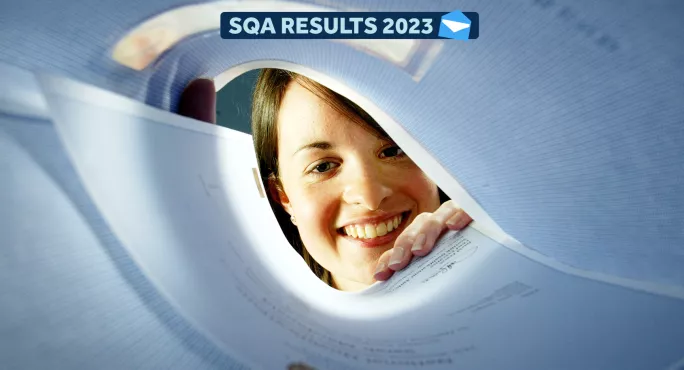
Annual Scottish Qualifications Authority (SQA) results and data have been published - the first since the landmark Hayward review on qualifications and assessment was published in June.
They reveal that the pass rate at National 5, Higher and Advanced Higher has decreased once again - particularly at N5 and Advanced Higher - and is now very close to the levels recorded in 2019, the last year before the Covid pandemic hit.
Scottish exam results: attainment gap close to pre-Covid level
Meanwhile, the attainment gap at Higher between the students living in the most and least deprived areas of Scotland has once again increased this year, and is within a percentage point of that recorded in 2019.
The cancellation of national exams in 2020 and 2021 led to significant increases in the proportion of students from the most disadvantaged areas, in particular, gaining national qualifications, but the attainment gap grew again in 2022 after the return of exams.
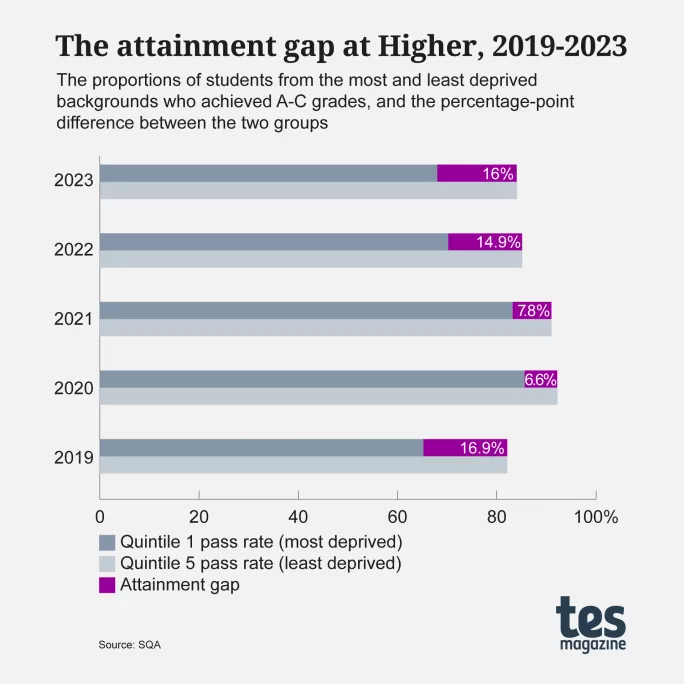
This year, the A-C pass rate at National 5 is 78.8 per cent, compared with 80.8 per cent in 2022 (it was 85.8 per cent in 2021, 89 per cent in 2020 and 78.2 per cent in 2019).
The pass rate at Higher is 77.1 per cent, compared with 78.9 per cent in 2022 (87.3 per cent in 2021, 89.3 per cent in 2020 and 74.8 per cent in 2019).
And the pass rate at Advanced Higher is 79.8 per cent, compared with 81.3 per cent in 2022 (90.2 per cent in 2021, 93.1 per cent in 2020 and 79.4 per cent in 2019).
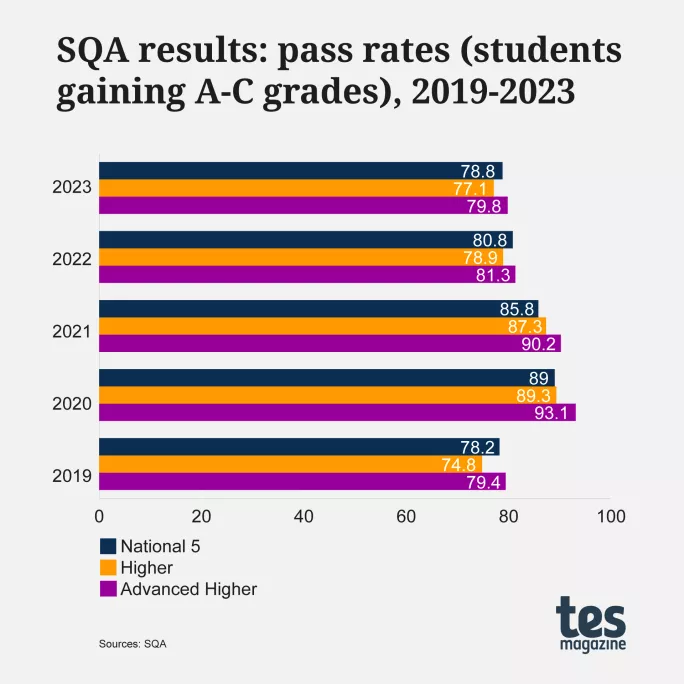
At Higher, the attainment gap between those students living in the most and least deprived areas is 16 percentage points, compared with 14.9 in 2022, 7.8 in 2021 and 6.6 in 2020.
In 2019, the attainment gap at Higher was 16.9 percentage points.
Scottish Labour education spokesperson Pam Duncan-Glancy said the data “shows that the poverty-related attainment gap is still persisting across subjects and that pupils from more deprived backgrounds continue to be failed”.
She added: “The fact is that after over a decade and a half of SNP rule, progress on tackling the attainment gap for people from deprived backgrounds, people with additional support needs and minorities is stalling.
“The results have basically gone back to 2019 levels, but we knew then the system was unequal. A return to pre-Covid is not good enough.”
Scottish Conservatives education spokesperson Liam Kerr said: “The widening attainment gap should be a source of shame for ministers - pupils from the most disadvantaged backgrounds have been let down year after year by the SNP.”
Also published were pass rates for the different school sectors. The Higher A-C pass rate in independent schools was 93.2 per cent, a drop of just 0.2 percentage points from 2022, when the pass rate was 93.4 per cent.
In state schools, the Higher pass rate was 75.9 per cent, a drop of 2.1 percentage points from the 2022 pass rate of 78 per cent.
Meanwhile, at a time when secondary headteachers are frequently underlining the importance of offering many more pathways, courses and qualifications than in the past, the growth of National Progression Awards (NPAs) continues to be striking - uptake has grown by 20 per cent in a year.
SQA results and ongoing Scottish exams reform
Before the results were published, education secretary Jenny Gilruth, in her first in-depth interview since taking up post in April, told Tes Scotland about some of her thinking around ongoing assessment reform. She likes the ideas of more continuous assessment and of using a broader range of assessments, but is “in two minds” about the prospect of effectively scrapping external exams in S4.
However, on results day itself, Ms Gilruth’s immediate focus was on the grades being received by thousands of students, and she told them they should be “celebrating your achievements” and “incredibly proud of all you have accomplished”.
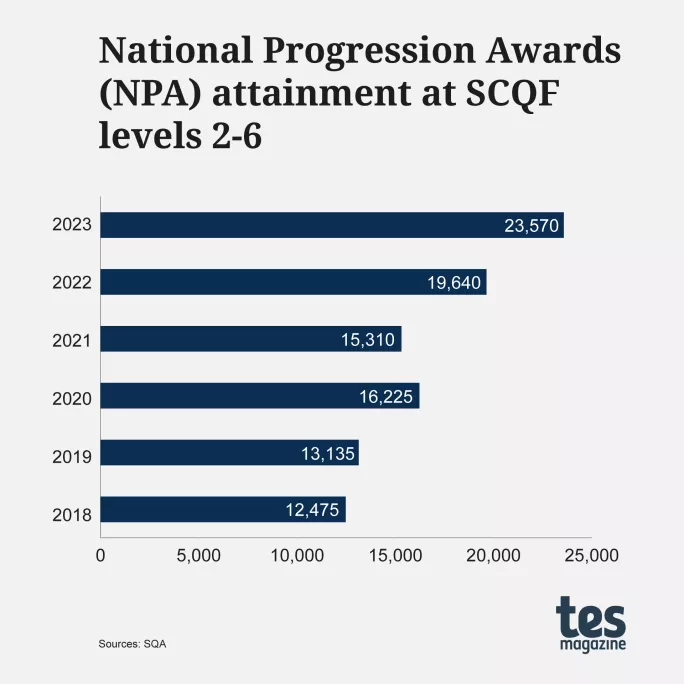
Ms Gilruth said: “I would also like to send my sincere thanks and gratitude for the continued dedication and commitment of those in our education system - thank you to all of Scotland’s teachers, lecturers, support staff as well as parents and carers for supporting our young people.
“There is much to celebrate in what is another strong set of results showing a clear and continuing recovery from the pandemic - with pass rates at National 5, Higher and Advanced Higher above the 2019 pre-pandemic level, a record number of passes at National 5 and the highest number of vocational and technical qualifications ever awarded.”
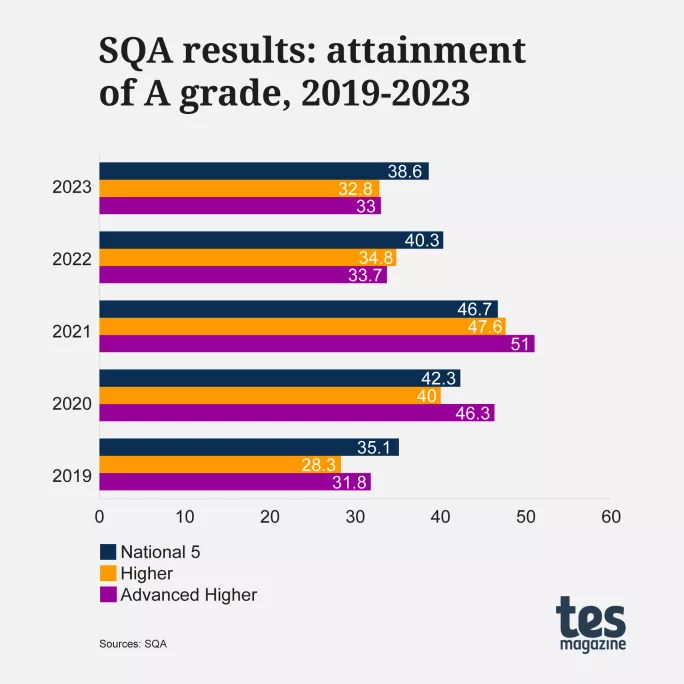
She added: “While we know that the pandemic has disproportionately impacted young people from more disadvantaged backgrounds, these results show that the gap in attainment levels between the least and most deprived areas remains narrower than it was in 2019.
“We are determined to build on the progress that has been made and we are investing a record £1 billion in the Scottish Attainment Challenge during this parliamentary term.”
Andrea Bradley, general secretary of the EIS teaching union, said: “Young people across Scotland, supported by their teachers and other education staff, have worked extremely hard to accomplish these results, and deserve high praise for their efforts. These results have been achieved despite the significant continuing challenges of education recovery in the post-pandemic era, together with the added pressure of the cost-of-living crisis and the impact of poverty on far too many families across Scotland.
“That the attainment gap has narrowed compared to pre-pandemic [2019] is to be welcomed but that there is still a gap at all underlines the need for increased support for students and families, and reform of the assessment system.”
Ms Bradley added: “Not all young people will have achieved the results that they hoped for, and they will require appropriate support to assist them in deciding their next steps. The current high-stakes exam system does pile huge pressures onto young people, which is something that must be addressed in the reform of the qualifications system arising from the Hayward Review.
“Scotland must now push ahead with bold and innovative change to deliver a qualifications system that best meets the needs of all young people in schools and colleges across Scotland.”
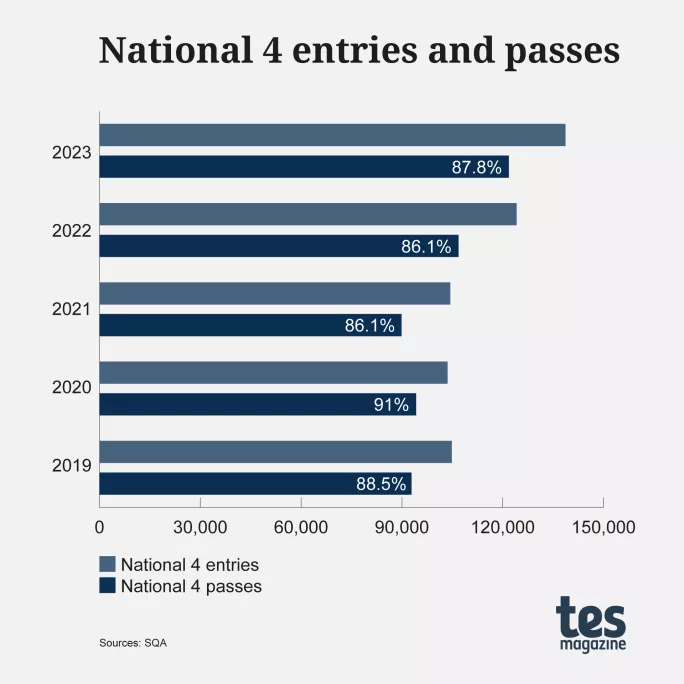
SQA National 5 maths concerns
Although the SQA said attainment was up on pre-pandemic levels “across most courses at National 5, Higher and Advanced Higher”, National 5 maths was “a notable exception” and “overall performance is weaker this year”. Just 62.4 per cent of N5 maths entries gained an A-C pass this year, compared with 69.7 per cent in 2022 and 65.5 per cent in 2019.
The SQA said there were “a number of factors” at play, including “a significant number of dual entries at National 4 and National 5” and “significant growth” in entries for N5 applications of mathematics.
The N5 applications of mathematics qualification was launched in 2017-18 and replaced the old “lifeskills mathematics” qualification. Entries have risen sharply, from around 2,500 in 2018 to just over 19,000 this year. This is partly owing to high-attaining students being presented for both it and N5 mathematics and now the SQA is suggesting this could be having a negative impact on the more established main maths qualification.
In 2023, dual entries at N4 and N5 were 30,530, or 9.5 per cent of total entries at N5 - a significant increase on pre-pandemic levels, at 13,595 (4.7 per cent) in 2019.
2023 results a ‘positive step’ back to normal
Looking at the overall picture of this year’s results, SQA chief executive Fiona Robertson said: “Our warmest congratulations to the 140,000 learners receiving their certificates. They should be proud of their achievements.
“Learners can be confident that the qualifications that they have earned - by demonstrating their knowledge and skills - provide a solid foundation for the next stage in their learning, training or employment. We wish them all continued success.
“These strong results also prove the resilience of Scotland’s learners, whose success has been enabled and supported by the hard work of teachers, lecturers and the wider education community.”
Ms Robertson added: “This year does not mark a return to normal for learners and educators. But it marks another significant and positive step on the path back to normal awarding, following the years of disruption to learning and teaching caused by the pandemic.
“Our sensitive approach to awarding this year was developed with and supported by the education community. It has given learners the best chance of performing to the best of their abilities.
“Together, we have delivered fairness for all learners while maintaining national standards and the credibility of our qualifications in Scotland and beyond - and learners can have confidence in their grades.”
Grade boundaries: Covid’s impact on performance
In an interview with Tes Scotland ahead of the results being published, Martyn Ware, the SQA’s director of policy, analysis and standards, said students are still not where markers would expect them to be in terms of their “knowledge, skills and understanding”, especially when it comes to modern languages.
He said that where Covid continued to have an impact on performance in the exams, this had been taken into account when setting the marks needed to achieve different grades. However, he also said there had not been “large adjustments on the whole”.
Ms Gilruth said: “For those who don’t get the results they were looking for, a free and direct appeals service will give all young people the right to request a review of their marked exam papers or coursework for their National 5, Higher and Advanced Higher results this year.
“Additionally, as you consider your next steps there is help available to guide you. The Skills Development Scotland careers helpline can offer practical information and careers advice as well as support for wellbeing. The SQA helpline is also open and can help students and their families with queries relating to the Scottish qualifications certificates.”
‘Serious reservations’ about 2024 SQA exams
Meanwhile, the Scottish Secondary Teachers Association (SSTA) is already expressing “serious reservations” about 2024 SQA qualifications.
General secretary Seamus Searson said: “We anticipate considerable pressure being placed on pupils and teachers due to the SQA’s insistence that all national qualifications return to pre-pandemic arrangements next year.
“On the one hand, the SQA accepts that there have been difficulties in 2023, but on the other hand denies it is an issue. While the school system continues to recover from the effects of the pandemic, and to help protect teachers and learners, the SSTA is continuing to urge the SQA to adopt a phased return to full requirements.”
Meanwhile, Mike Corbett, Scotland national official for the NASUWT teaching union, said the union would be looking for the education secretary to “make good on her pledge to make the views and perspectives of teachers central to the development of a new system of qualifications and assessment, as outlined in the recent Hayward review”.
He added: “The review proposed the introduction of a Scottish diploma, which would place a much greater emphasis on personal achievements and extracurricular activities than the current exam-focused system.
“Such a system has obvious merits but also potential drawbacks unless it is developed carefully, drawing on the full experience and knowledge of the teaching profession in its design and implementation.”
SQA exams appeals changes
While many aspects of the SQA exams process have returned to pre-pandemic standards, this year students will be able to request a free review of their exam paper without necessarily needing to go through their school or college. Before Covid, schools were charged for any appeals that did not result in a change of mark.
However, a number of education commentators have expressed concern that this year’s appeals process marks a return towards pre-Covid approaches, and say that the limited means of reassessing a student’s results cannot accurately be described as an appeal in the true sense of the word.
Find out how to appeal and other key information
Rise in first-choice university placements
Meanwhile, figures released by admissions service Ucas, to coincide with SQA results day, show that 72 per cent of Scottish applicants aged 19 and under (18,780) have gained a place at their first choice of university, up from 69 per cent in 2022 (18,680) and 65 per cent in 2019 (15,670).
In total, 30,050 Scottish students have been accepted, compared with 30,490 in 2022 and 28,750 in 2019.
Ucas chief executive Clare Marchant said: “I am delighted to see record numbers of young Scottish people celebrating receiving their first choice. While the number of overall applicants is down, we typically see a fall in mature applicant numbers when employment rates are high.
“[This year’s] figures show that demand for going to university or college is still healthy and much higher than pre-pandemic levels.”
Higher education minister Graeme Dey said: “Over 30,000 Scottish students have now got a university place this year, including 29,220 at Scottish institutions, which is above pre-pandemic levels - and we also know this is likely to increase in the coming days and weeks as more applications are processed.
“Widening access is a priority for this government, so I was encouraged to see a record number of 18-year-olds from the most deprived areas getting into university.”
topics in this article



